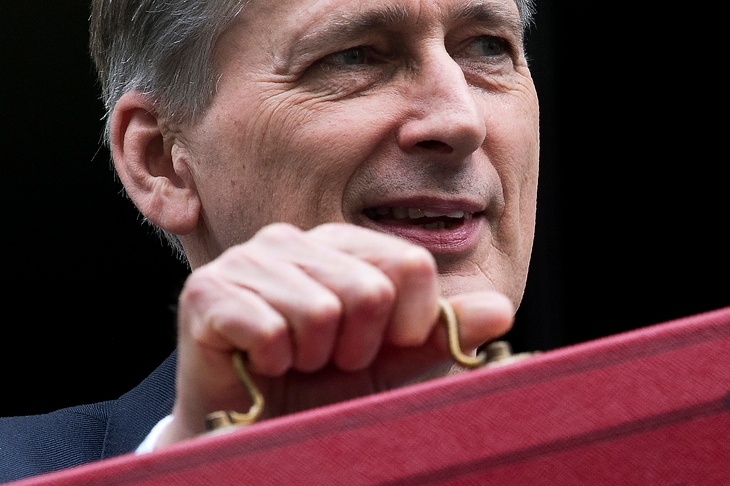After Philip Hammond delivered his Budget last week, he went to speak to a meeting of Conservative backbench MPs. Several were deeply alarmed about his tearing up of their manifesto pledge not to raise National Insurance. One asked him how sure he was about all this. Would they find themselves going out to defend this tax rise to their constituents, only to find him abandoning the policy later? No, the Chancellor replied, he would not change his mind. This tax rise was the centrepiece of his Budget, and it could not be scrapped. He was not for turning.
For a Chancellor to abandon his main Budget policy within a week is nothing less than extraordinary. It suggests a staggering lack of communication, forethought and basic political competence. Mr Hammond spent days claiming — bizarrely — that he had not broken the manifesto pledge. He sought to hide behind a law, passed after the election, that pledged not to raise Class 1 National Insurance contributions but said nothing about Class 4 contributions, which he raised from 9 per cent to 11 per cent. As we argued last week, it was a dishonest argument and would be viewed as such by voters. It would make many wonder if they could ever again trust a Tory tax promise.
Now, it seems, Mr Hammond agrees. His letter, released to colleagues, accepts that he had an obligation to be compliant ‘not just with the letter but also the spirit’ of the manifesto. That this appears not to have occurred to him sooner shows a startling lack of judgment and it will further damage his personal authority. His Budget was followed by a briefing war between No. 10 and No. 11, as allies of Theresa May and Mr Hammond blamed each other for the mess. In the end, the Prime Minister won and the Chancellor was ordered into a climbdown as humiliating as any in postwar political history. But No. 10 should remember that tensions between a Prime Minister and a Chancellor rarely end well for either side.
In a way, it is encouraging that the Conservatives have at last realised the importance of manifesto pledges. Mrs May might have a low regard for the document, which was assembled by aides of David Cameron who never imagined he would win a majority and have to implement it. But if the Prime Minister wishes to be freed from the pledges of the 2015 Tory manifesto, she should call a general election and issue her own.
Governing in such a haphazard way is seriously incompetent. Mr Hammond has already raised doubts about whether the Conservatives can be trusted to keep promises. Now people will be wondering if he and the Prime Minister can be trusted to implement the policies they have laid out in the House of Commons. And this at a time when Mrs May faces the prospect of a new Scottish referendum, fighting that campaign while carrying out the most complex negotiations this country has faced since the war.
This fiasco will have been watched with amazement in European capitals. If it appears that Mrs May’s government caves under pressure, then her opponents in Brexit talks will apply pressure. If her policies can be abandoned after a few days’ reflection, how seriously can anyone take anything that she says during the negotiations?
Mr Hammond has also sabotaged his fiscal credibility. The Chancellor had presented himself as a safe pair of hands, someone who would not engage in the clever-dick politics that characterised George Osborne’s time in the Treasury. He wanted to be seen as a competent, sensible finance director. For him to get into this mess in his very first Budget suggests that he isn’t up to the job.
What, now, are the financial markets to make of his Budgets or his promises? What other policies will he revoke after a few days, admitting that he had not given it enough thought? At a time when the UK government needs to borrow £140 million a day to meet its bills, credibility is a precious commodity. Hammond’s now seems to be in tatters.
Mrs May has, understandably, focused on getting Brexit right. Her policy so far has been clear and assured. But she now faces questions on how well — and even whether — the rest of her government is functioning. What are we to expect about her idea of bringing back grammar schools: will her Education Secretary be forced to make an announcement, only to row back later? What about the great white elephants that she has continued, HS2 and the Hinkley Point reactor? If she is in the mood for backtracking, why not save the taxpayer a small fortune by abandoning these too?
Theresa May faced Jeremy Corbyn in the House of Commons straight after announcing the U-turn. But Corbyn, predictably, missed the open goal. The weakness of the opposition has made the Conservatives lazy, unable to see the most basic problems lying around the corner.
Under David Cameron, the Tories gave the impression of a party that only seemed able to function properly when being dangled over a cliff by its opponents. It was said of Cameron that he had only two modes: deft panic, or complacent incompetence. It would be unfortunate if Theresa May’s party demonstrated only the latter.






Comments